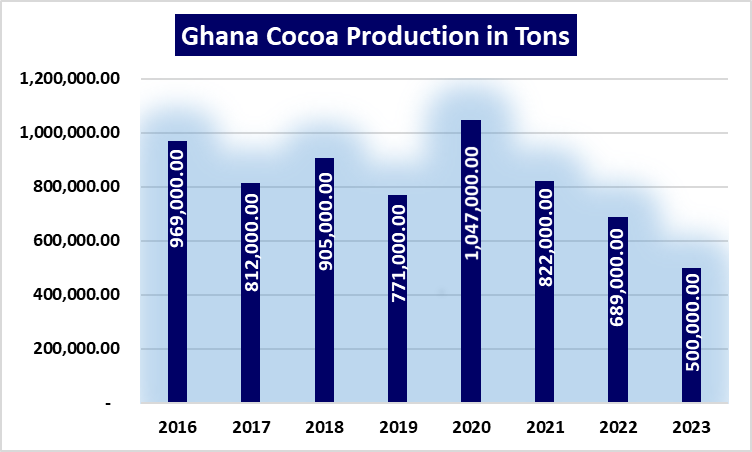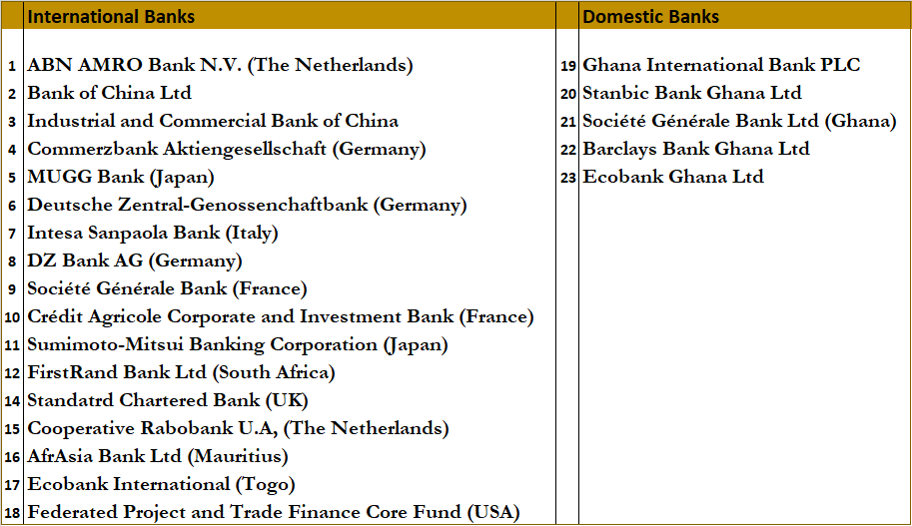Meet the oldest commodity trading house in Ghana
Dovene Kleman, Kumasi, Ghana
February 22, 2024
U nder colonial rule, the territory today known as the nation of Ghana recorded the first purchase of cocoa in 19001. Data for the period 1947-1948 show production of 211,879 tons. Today, Ghana produces over 900,000 tons of cocoa per year and exports to over 34 countries. The country has 1.9 million hectares of productive cocoa susface area and provides livelihood to over 1 million households. Cocoa accounts for a quarter of total export receipts2.
Institutional development
The COCOBOD buys cocoa form Ghanaian farmers and exports the crop to international buyers. Unlike other commodities trading houses, the COCOBOD does not seek to generate revenues from arbitrage, leverage or speculate on future price movements for example through derivatives. However, the company monitors cocoa futures contract prices in New York and London for internal economic analysis. It concentrates on purchasing, transportation, storage and marketing of cocoa, both internally and externally through a subsidiary called the Cocoa Marketing Company (Ghana) Limited (CMC).
The CMC takes the lead in negotiations with financial institutions for annual offshore syndicated loan facility. It negotiates with shipping lines, inspection companies and syndicate of international insurers. In Ghana, the CMC works with Licensed Buying Companies (LBCs) and public stakeholders in the cocoa supply chain.
The COCOBOD also has a quality control entity (Quality Control Company Limited), which is responsible for maintaining the quality of cocoa and also other exportable crops such as coffee and sheanut. This subsidiary inspects storage facilities and issuing certificates of registration for premises accepted as grading centers or depots. The COCOBOD applies the compliance standards of the International Cocoa Standards. At every stage of the cocoa value chain, the ICS requires cocoa to be well fermented, thoroughly dried and free from smoky beans. Quality cocoa must also be free from abnormal or foreign odor, living organisms and elements, and from any adulteration.
In recent years, the COCOBOD has endeavored to align all its activities with emerging environmental norms and specifically those related to the fight against deforestation, green house emissions and global warming.
Trading
Ghana has a commodities trading exchange; the Ghana Commodities Exchange (GCX). The Ghana Security and Exchange Commission (SEC) suprevises the GCX and provides rules for all types assets including agricultural commodities contracts. It also requires all traders to be certified members of the Exchange3. As members of the Exchange, traders (which includes farmers) and brokers must comply with GCX trading rules and SEC regulations4.
Since its establishment in 1947, the COCOBOD has functioned within a unique institutional framework even thouhgh financial and economic institutions have evolved, to reflect a changing domestic and international business environment. The GCX has an electronic trading plateform. However, despite these innovations, cocoa trading continues to take place outside of a modern and regulated exchange.
Development of the value chain
In the early 1990s, under the auspices of the International Monetary Fund (IMF), the government liberalized the cocoa business. Prior to the reform, the Ghana Cocoa Board was a quasi-regulator overseeing the entire value chain. Its activities ranged from financing, purchase, marketing to export and even transport.
Today, licensed buying companies (LBCs) carry out the internal purchasing and marketing of cocoa. Homegrown domestic companies such as BD Associates, Niche Cocoa Industries Limited, Cocoa Touton Ghana Limited, WAMCO, and Afrotropics Limited have also diversified into processing. These companies process 34 percent of total production. The government wants to increase this segment of the activities to 50 percent and foster further processing into finished products such as chocolate and cocoa beverages.
Banks, input suppliers, and logistics providers (Shipping and haulage) intervene in the contemporary value chain. Quality assurance consultants and seeds providers are also an integral part of this industry. Scientists, universities, manufacturers of agricultural machineries and producers of fertilizers and phyto-sanitary products provide resources and knowhow for the wellbeing of the cocoa tree.

Source: ICCO, COCOBOD, Data visualization www.neweconomyghana.com
Financing and revenues
COCOBOD finances operations through borrowings on the domestic and international markets, by collateralizing forward sales of cocoa beans. On September 23rd, 2021 for the example, the COCOBOD reported the signing of a US$1.5 billion pre-export syndicated finance agreement with a consortium of local and international financial institutions to finance cocoa purchases for the 2021/2022 Season. A total of 28 institutions, including 4 local and 24 international financial institutions participated in this syndication facility. A similar operations raised US$1.3 billion in 2020.
Illustration: Syndicate financial institutions (2020)

Source: Cocobod, Compilation of data from lenders' annual reports
Trade data show that the country earned US$2.28 billion (2019), US$2.33 billion (2020) and US$2.85 billion in 20213 from cocoa export. The European Union remains the top destination of Ghana's cocoa beans. Shipment of cocoa to the Europe Union accounted for 61 percent of total cocoa beans exported. The Cedi depreciation against the dollar and the Euro, high interest rates and high inflation, have destabilized cocoa finance at every level. Under the 2023 Extended Facility Agreement between the Government of Ghana and the International Monetary Fund (IMF), the COCOBOD agreed to implement reforms to streamline operations and reduce debt. By 2023, domestic borrowing had ballooned to US$659.7 million (GH₵7.93 billion) which the COCOBOD restructured through a domestic debt exchange program4.
Poverty alleviation
Despite improvements in the standard of living and the economic importance of cocoa, cocoa farming families live in abject poverty. In West Africa, cocoa farmers earn a per capita daily income of USD $0.40-$0.45, according to the Switzerland-based International Cocoa Initiative (ICI)5. This amounts to an annual net income of USD $983.12-$2627.81 (including government subsidies) and accounts for two-thirds of cocoa farmers’ household income.
The COCOBOD has a long track record of engagements for the social welfare of cocoa farmers. Besides working on climate issues, the elimination of child labor, the company seeks to boost the income of farmers to lift them out of poverty. However, according to the charity organization Oxfam, the root cause of poverty is the low price paid to farmers by international traders and chocolate manufacturers6.
In 2018, Ghana and Côte d'Ivoire setup the ‟Côte d'Ivoire–Ghana Cocoa Initiative (CIGCI)” to raise prices for farmers. Together, the two countries produce over 70 percent of the world's cocoa. In 2019, CIGCI recommended a US$400 premium from cocoa buyers called the Living Income Differential (LID). If this measure is implemented, it would correspond to a 16 percent markup on the market price that will go directly to farmers. On October 12th, 2022, Nigeria and Cameroon applied to join this emerging alliance of cocoa producers in favour of farmers. International chocolate makers and traders have expressed an interest, but have so far failed to take concrete actions to implement the initiative, or to imagine any other alternative solution to improve the living conditions of cocoa farmers.
Related Articles
BIBLIOGRAPHY
1❩ Shashi Kolavalli and Marcella Vigneri (2010): Cocoa in Ghana: Shaping the Success of an Economy - https://documents1.worldbank.org/curated/ru/304221468001788072/930107812_201408252033945/additional/634310PUB0Yes0061512B09780821387450.pdf
2❩ Howard Hudson (2022): "Ghana is cocoa, cocoa is Ghana", OPEC Fund - https://opecfund.org/news/ghana-is-cocoa-cocoa-is-ghana
3❩ https://sec.gov.gh/wp-content/uploads/Final-Regulatory-Laws/Guidelines/Commodity_Exchange_Guidelines_2019.pdf
4❩https://gcx.com.gh/news/gcx_top_news/first-electronic-trade-on-the-ghana-commodity-exchange-executed.html
5❩ GCB Bank (2022): Sector industry analysis (Cocoa 2022) - https://www.gcbbank.com.gh/research-reports/sector-industry-reports/120-cocoa-industry-in-ghana-2022/file
6❩ https://cocobod.gh/news/launch-of-cocoa-bills-exchange-programme
7❩ The ICI is a non-profit foundation that works to protect the rights of children and adults in cocoa-growing countries.
8❩ OXFAM (2023): Chocolate giants reap huge profits as promises to improve farmers’ incomes “ring hollow” - https://www.oxfam.org/en/press-releases/chocolate-giants-reap-huge-profits-promises-improve-farmers-incomes-ring-hollow
